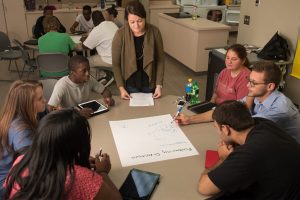As World Down Syndrome Day approaches on March 21, The University of Alabama remains committed to providing transformative opportunities to young children and adults with Down syndrome through two innovative programs.

UA’s RISE Center opened Oct. 1, 1974, through funding by the U.S. Office of Health, Education and Welfare as a demonstration program designed to serve young children with physical disabilities from birth to five years of age. RISE has evolved to become a nationally recognized early childhood education program dedicated to excellence in service, research and teaching. While the program predominately serves young children with disabilities, it includes children who don’t have disabilities.
“I love the inclusion model,” said Andi Gillen, director of the RISE Center. “I love the fact that traditional learners and children with special needs are working side by side. And that truly in a RISE classroom, we do not know who the children with special needs are. It is the purest form of inclusion.”
In its infancy, RISE served six children in one room of a house on campus. Over the years, the program has received support from the local community and loyal supporters that have allowed it to grow exponentially. Former UA head football coach Gene Stallings, whose son was born with Down syndrome, has been one of the program’s biggest advocates. Today, RISE is housed in the Stallings Center and serves close to 100 children.
“We are more than just a school,” said Gillen. “We provide the foundation for an inclusive community that celebrates diversity. As we celebrate differences, our goal is to help each child reach their maximum potential.”
The RISE Center is a fully inclusive environment, also providing job opportunities to those with disabilities. RISE employs nine adults with disabilities, including several graduates of the program.
CrossingPoints
While RISE focuses on educating young children, CrossingPoints provides young adults with intellectual disabilities the opportunity to develop life skills through a three tier program with each tier specialized for students.
Tier 1 is a partnership among UA and the Tuscaloosa City and County school systems that helps students develop skills necessary for successful adult functioning. Tier 2, known as the Summer Bridge Program, provides students a structured opportunity over an eight-week period of UA’s summer school to experience, develop, explore and hone skills for pursuing postsecondary education at a higher education institution of choice.
Tier 3 allows individuals to pursue a CrossingPoints Certificate in Occupational Studies, a non-degree certificate program for those interested in pursuing postsecondary education at UA. CCOS seeks to provide students a high quality and inclusive college experience.
“Through the data we’ve collected in Summer Bridge, we’ve learned that the supports we need to provide students with intellectual disabilities who are attending college must go beyond academic supports,” said Dr. Kagendo Mutua, director of CrossingPoints. “We have also learned that the challenges faced by our students in the Tier 3 program are not that different from those faced by other freshmen and that perhaps we need to focus less on what is different about them, and more on what we can do differently as a campus community so that their disability makes little difference in their experiences at the University.
“In other words, they are teaching us to see disability as less about impairments and more about social barriers that create functional limitations. They are teaching us to recognize such barriers and remove them, thereby working together to create an inclusive environment where disability makes no difference.”
